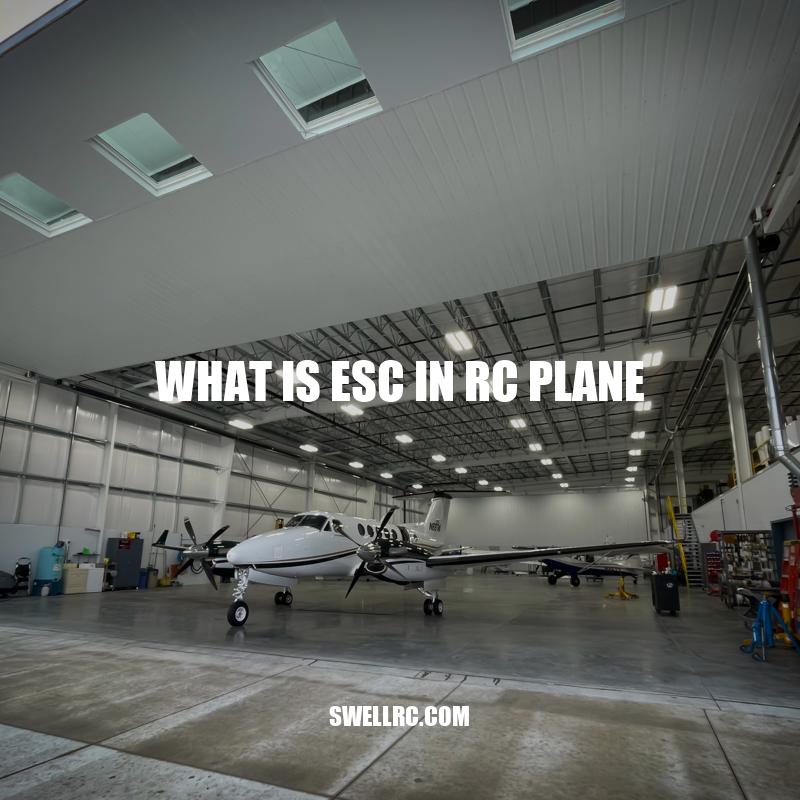Understanding ESC in RC Planes
ESC or Electronic Speed Controller is an integral component of radio-controlled (RC) planes, and it plays a crucial role in regulating the speed of electric motors. Regulating the speed of the motor is essential as it directly affects the lift, stability, and control of the RC airplane. The key function of an ESC is to deliver the appropriate amount of power to the motor, ensuring that it remains operational within a certain range. As the amount of throttle is increased, the ESC then sends more power to the motor, increasing its revolutions per minute (RPM) and resulting in more speed. Without an ESC, the RC plane might be uncontrollable, and you may damage it during takeoff or landing. Although ESC has been around for a while, it has significantly evolved, and the latest ones are much more advanced and flexible. In this article, we will explore what an ESC is and how it works, the different types, and their features.
How ESC Works
ESC works by interpreting the signal from the receiver and generating a pulse width modulated signal to control the motor speed. When the throttle on the transmitter is increased, the receiver sends a signal to the ESC, which increases the voltage and current of the motor. Here are some key features of how an ESC works:
- The ESC regulates voltage from the battery to the motor
- It interprets the input signal from the receiver
- It generates a pulse-width modulated signal to the motor to control the speed
- It monitors the temperature of the motor and prevents overheating by reducing the power supply if necessary
- Some ESCs have brake features that allow for better control during landings
If you are looking for a high-quality ESC, numerous websites offer a vast range of products to fit your RC plane’s specific size and motor type. Whether you are a beginner or an experienced pilot, you can choose from different options and features to customize your ESC to get the best performance from your RC plane. You can find great ESCs from top brands such as Horizon Hobby, LHI, and HobbyKing.
How does the ESC work?
ESC, or electronic stability control, is a safety feature that helps drivers maintain control of their vehicles during emergency maneuvers or difficult driving conditions. Here’s how it works:
- Sensors monitor the speed, steering, and individual wheel rotation of the vehicle
- The ESC control unit analyzes this data to determine if the vehicle is at risk of losing control
- If a risk is detected, ESC can automatically apply the brakes to individual wheels and adjust the engine power to help the driver regain control of the vehicle
ESC is a standard feature on most modern cars and can greatly improve driving safety. If you’re interested in learning more about vehicle safety features, check out websites like the National Highway Traffic Safety Administration or Consumer Reports.
Types of ESC
There are various types of ESCs available in the market based on the motor and plane’s size and complexity. Here are some of the common types of ESCs:
| Types of ESCs | Features |
|---|---|
| Brushed ESC | It’s suitable for small and inexpensive RC planes |
| Brushless ESC | It’s commonly found in more advanced models and uses a brushless motor |
| Programmable ESC | It’s equipped with a microprocessor allowing for precise customization and programming |
One interesting fact about ESCs is that they used to limit the RPM of an electronic appliance like drills and vehicles. The invention of the electronic speed regulator was not only confined to RC planes but extended to other electronic devices as well.
You can find a wide range of ESCs on various websites that specialize in RC planes and parts. It’s essential to choose the right ESC for your RC plane to ensure its smooth operation and long life. You can look for an ESC that offers specific features like adjustability, temperature monitoring, or braking for better control during landings.
How do I choose an ESC for my rc plane?
When it comes to choosing an ESC (Electronic Speed Controller) for your rc plane, it is important to consider the following factors:
- Size and weight of your rc plane
- The type of motor you are using
- The voltage of your battery
- The rated amperage of the ESC
- The number of cells in the battery pack
- The types of connectors used on the ESC, motor and battery
It is important to choose an ESC that matches your specific requirements. Some popular ESCs for rc planes include the Castle Creations ESCs and the Hobbywing ESCs. You can find more information on different ESCs on websites such as Amazon, RC Planet and HobbyKing.
Choosing the Right ESC
Choosing the right ESC for your RC plane is crucial to ensure the best possible performance. To select the right ESC, you need to consider several factors such as the weight and size of the plane, the motor power, and the battery voltage. Here are some points to keep in mind when selecting the right ESC:
- Check the ESC’s Amp Rating and make sure it can handle the current requirements of your motor.
- Choose an ESC that matches the battery’s voltage range.
- Consider the plane’s weight and select an ESC that delivers the necessary power.
- Opt for an ESC that provides adjustable settings, such as throttle response, timing, and brake settings.
- Make sure that the ESC’s size and weight do not affect the plane’s balance.
Several online stores offer a wide range of ESCs suitable for RC planes. You can browse through various options to find the one that matches your requirements. Before buying, make sure to read product specifications and customer reviews to make an informed decision. Many online stores also offer helpful guides and tutorials to help you choose the right ESC for your RC plane.
How do I choose an ESC for my RC plane?
- Look for an ESC that matches the voltage rating of your battery and the motor’s maximum amp rating.
- Consider the type of motor you have – brushless or brushed – as different ESCs are designed to work with each.
- Check the weight and size of the ESC and make sure it fits in your plane without affecting its balance.
- Take note of the programming options available, such as throttle range, brake, and timing settings.
- Consider the brand’s reputation and customer reviews before making a purchase.
For more detailed information, check out resources such as the HobbyKing website or specific ESC products like the Castle Creations Talon series.
Conclusion
In conclusion, ESC is an essential component of an RC plane that regulates the motor’s speed and ensures a better flying experience. It is crucial to choose the right ESC for your RC plane by considering various factors such as motor power, battery voltage, and weight. Choosing the wrong ESC can result in motor failure, overheating, or even crashes, so always take the time to research and choose the right one for your plane.
Using a quality ESC and maintaining it well will help ensure the longevity and reliable operation of an RC plane. Regularly checking the ESC for any signs of wear or damage and replacing it as needed is a critical part of maintaining an RC plane. By following proper care and maintenance procedures and choosing the right ESC, you can extend your RC plane’s life and enjoy the exciting experience of RC flying for years to come.



